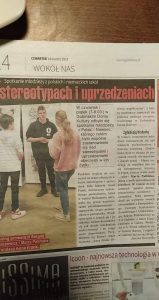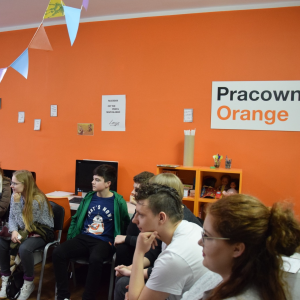Wystawa na granicy polsko-niemieckiej
Pod załączonym linkiem znajduje się relacja Marty Palińskiej, która 9 marca razem z Sergiejem Kulczewiczem w Gubińskim Domu Kultury prowadziła dla młodzieży ze szkół polskich i niemieckich trening przygotowujący do oprowadzania po wystawie.
ttps://pracownieorange.pl/
Wydarzenie zostało również zauważone przez lokalną prasę.

Evaluation Anne Frank – Gubin-Guben March 2019
Evaluation Peer Education Training and Exhibition Anne Frank. A History for Today in Gubin, March 2019, with the German Europa School (Europa Schule) from Guben and the Polish PrimarySchool nr. 3 (Szkoła Podstawowa nr. 3 / SP 3) and the Polish European Centre for Vocational Training and Continuing (Europejskie Centrum Kształcenia Zawodowego i Ustawicznego / ECKZiU) as well as the House of Culture in Gubin (Gubiński Dom Kultury) in Gubin, provided by the Anne Frank Foundation – Anne Frank Polska.
Preparation and aim of this evaluation (see also the Plan exhibition Anne Frank and common training with German and Polish pupils / students in Gubin/Guben, as send the 19th December 2019)
In November 2018 the German (in Guben) and Polish schools (in Gubin) as well as the House of Culture in Gubin agreed to organise with us a training and exhibition in the House of Culture. The training was provided by Marta Palińska and Sergiej Kulchevych. Marta is one of our YLP participants and she comes from Gubin.
Aim of this cooperation was
– to provide this activities for pupils and students in a place as Gubin/Guben and on this way contributing to the Polish-German-Jewish dialogue;
– in this framework to check the possibility to provide a Memory Walk project in Gubin-Guben and prepare a map with places connected with WWII or history in general in both cities, with students from this border-cities, later this year;
– to check in which way it could be possible to provide such activities in other double border-places of both sides of the Nyssa-Neisse and Odra-Oder border – and, together with the German Anne Frank Centre in Berlin, to prepare a “project Anne Frank on the Polish-German border” with activities as the peer education training, the exhibition and Memory Walk.
We invited also the German Pestalozzi School in Guben, but this school was not able to participate.
Before the training we (Marta Palińska and Edward Skubisz) organised a meeting (14 February 2019) between directors and teachers of the involved schools with in order to prepare details of this training and of the visiting from the schools. I’m writing here the report of Marta Palińska of this meeting:
“To sum up our findings, we will meet each other at training 7.03 (Thursday) and 8.03
(Friday) in the Gubin House of Culture from 8:00 to 14:00.
We agreed that 10 people from the Europaschule and 10 people from the schools in Gubin (SP 3 and ECKZiU, probably 5 people from both schools) will take part in the workshop. It would be ideal, if the pupils can speak a small extent in another language, that means, students from Guben in Polish or English, students from Gubin in German or English. The training will be translated, but the knowledge of an additional language will be a facilitation in direct communication between students. Also we agreed to invite, for each of those three groups, a teacher / contact person of the school.
Guided tours of the exhibition will take place in the “Fara Tower” between 18.03 and 29.03. During this time, each of the trained people will show around the exhibition at least two groups. Guided tours will be provided in pairs – at the workshop, we will decide with the youngsters whether they want to do it in mixed groups or not and in which languages.
We invite six to seven groups to watch the exhibition from each of the schools (approximately 20-person group). are required for guiding one group we need teaching hours. I think it will be the most reasonable to set a schedule when youngsters during the training will decide in which languages they want to provide the exhibition.
At the end, on 29/03, we would like to meet again with the trained guides and teachers in order to evaluate this work and to decide on a possible follow-up in the form of Memory Walk.”
The “Fara Tower” and the House of Culture in Gubin
Later it became clear that the “Fara Tower” was not disponible by reason of technical problems and Marta Palińska was able to find another place in the House of Culture.
Marta and Sergiej prepared a special schedule for several parts of the training.
Training 7 + 8 March,
Unfortunately, nobody from the Anne Frank Zentrum from Berlin was able to be in Gubin and observing / taking part in the training.
The training, provided by Marta Palińska and Sergiej Kulchevych, became realised. It was a good experience: especially we became aware that the language was
– not a problem, because mostly of the students from the German Europa School came from Poland, so they spoke Polish with the Polish pupils and students!
– a problem, because we were not able to get experience with not Polish speaking students from German side.
The cooperation with the teachers during the training was not giving problems. They assisted but didn’t interfere with the content.
Marta and Sergiej understood from the students and pupils that daily life of people in both cities is connected with stereotypes, not only to “Germans” or “Poles”, but also to immigrants / refugees now living in Germany. Talking about the items of the exhibition was sometimes annoying for the pupils and students; Marta and Sergiej got the feeling that the participants sometimes felt themselves compelled to talk, against their will, about their stereotypes.
But Marta and Sergiej and the participants, with the assistance of their teachers, realised the training according their schedule. The participants became prepared to provide the exhibition to their colleagues form their schools. One pair of students from both polish and German schools provided the exhibition, Two other German schools’ students decided to worked together. The rest of groups of guides were Polih.
Exhibition 18 – 29 March
It became clear that the “Fara Tower” was not disponible by reason of technical problems and Marta Palińska was able to find another place in the House of Culture, also with the assistance of Marcin Gwizdalski.
During the exhibition period the coordinating teacher from the Europa School became ill, also the director of this school was ill. And sometimes the student from that school was ill. Marta Palińska as the coordinator had to deal with such problems. But finally, mostly of the planned visits became realised.
Evaluation 29 March
With the pupils and students and their teachers Marta Palińska and Edward Skubisz provided an evaluation of the training and the exhibition. We used the “hand” with five fingers / questions: what was ok, what we can do better, what was not nice, what do I got for myself, what was missing. Here is a review of this.
– Training
It became clear that for the participants it was nice to have free for the training and the providing activities, not only because it was funny not to have lessons on school, but also the “innovating” way in which they got this training and experience. atmosphere was friendly. And is was nice to meet each other from several schools. The information, skills and tools they got during the training was helping them to be prepared for providing the exhibition. Maybe 2 days are too short, according some of the participants
– Providing the exhibition
But also during the providing the trained participants became aware that it is hard to work with groups which sometimes are making a lot of noise. They make clear that it could be helpful, before visiting the exhibition, to show the film and to have a introduction in the school.
Sometimes they became able to provide a discussion about different opinions connected with the content and challenges of the content (stereotypes, discrimination).
Between the visiting groups sometimes there was a too big gap.
The place of the location was to small, especially when the groups were big.
– Memory Walk
Enthusiastic the participants agreed to start with the Memory Walk. Others are also invited. 27 + 28 May we will provide a workshops about the content, about how to make an interview and about how to film – in cooperation with active film-groups of the schools.
